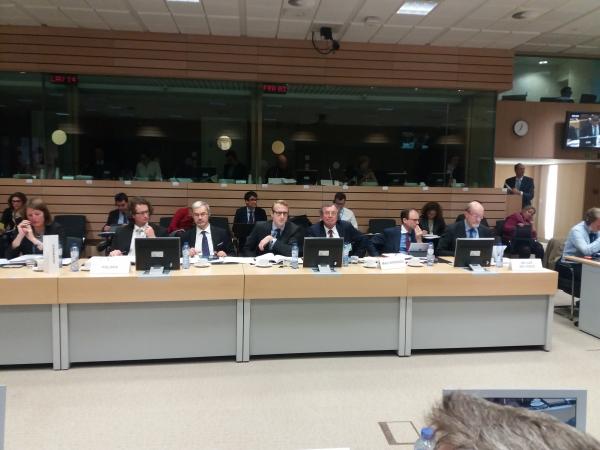The Council agreed on the draft regulation to ban unjustified geo-blocking and other forms of discrimination based on customers' nationality, place of residence or place of establishment. In line with the Digital Single Market Strategy the proposal is intended to boost e-commerce. The general approach will serve as the Council's common position to start negotiations with the European Parliament under the EU's ordinary legislative procedure. Minister of State Krisztián Kecsmár welcomed the efforts made by the Slovak Presidency and underlined that in our view the text put forward for a first-reading agreement in the Council provides for an adequate balance between the interests of the costumers, the contractual freedom of the traders, and the principle for providing legal clarity.

The Council held a policy debate on the implementation of Single market strategy in presence of Commissioner Bieńkowska. Minister of State István Lepsényi highlighted that Hungary agree with the removal of unjustified or disproportionate regulatory and non-regulatory restrictions. However any new proposal should follow the better regulation principle focusing on administrative simplification.
During the regular competitiveness check-up this time ministers focused on the possibilities of skills development and the link between the education system and the labour market. The discussion was based on Commissioner Bienkowska’s presentation. Minister of State István Lepsényi welcomed the New European Skills Agenda and supported its objectives: developing and retraining skilled work-force and activating the largest possible share of the work-force are crucial for the Hungarian skills policy.
The Hungarian delegation requested a debate on the Commission initiative “European Pillar of Social Rights”, declaring that social, competitiveness and economic policy aspects cannot be addressed separately; therefore, this issue should feature regularly on the agenda of the Competitiveness Council. Besides, State Secretary Lepsényi pointed out that the proposal (under preparation by the Commission, and public consultation is still open) should respect the integrity of the Single Market as well as the principle of subsidiarity. Several Member States shared the concerns of the Hungarian delegation. The Commission also welcomed the debate and explained that the main purpose of the proposal will be to provide a reference framework for social progress.
Talking about progress, it was also a very important moment that the United Kingdom confirmed that they would proceed with the ratification process of the Agreement on a Unified Patent Court and would cooperate with the Member States in order to launch the unitary patent system as soon as possible, during the first half of 2017. Minister of State Krisztián Kecsmár from Hungary, as well as a number of other ministers and Commissioner Bienkowska, underlined that a unitary patent system entering into force in the near future with the broadest possible geographical coverage serves the interest of the European industry.
During the working lunch ministers had an open discussion about the future of the European car manufacturing industry; what are the challenges, what priority actions should be considered. State Secretary Lepsényi informed his colleagues on the Hungarian government’s most recent plans and actions to promote low emission mobility and reported on the Regional Digital Summit held on Budapest on 17-18 November 2016, focussing on connected and autonomous driving.

A reálgazdaság versenyképességi helyzetének értékelése során a résztvevők áttekintették a készségfejlesztés lehetőségeit, illetve az oktatási rendszer és a munkaerőpiac közötti kapcsolatot. A véleménycserére Elżbieta Bieńkowska biztos asszony prezentációja alapján került sor. Lepsényi István államtitkár úr kifejtette, hogy Magyarország számára kiemelt fontosságú a megfelelő szakmai készségekkel felvértezett munkaerő kiképzése és megtartása, a lakosság minél nagyobb arányban való aktivizálása.
Az Egyesült Királyság megerősítette, hogy folytatni fogják az Egységes Szabadalmi Bíróságról szóló megállapodás ratifikációs eljárását, és együtt fognak működni a tagállamokkal annak érdekében, hogy az egységes szabadalmi rendszer mihamarabb, 2017 első félévében elindulhasson. Kecsmár Krisztián államtitkár úr számos tagállami miniszter és Bienkowska biztos asszony mellett hangsúlyozta, hogy az európai ipar érdekét is a minél szélesebb földrajzi lefedettségű, a közeljövőben hatályba lépő, egységes szabadalmi rendszer szolgálja.
Magyar kezdeményezésre a tanácskozáson a résztvevők foglalkoztak a jelenleg még nyilvános konzultáció alatt álló szociális jogok európai pillérének létrehozásáról szóló előzetes bizottsági tervezettel is. Magyarország részéről Lepsényi István államtitkár kiemelte, hogy a kezdeményezés húsz szakpolitikai területet magába foglaló ambiciózus és komplex, a foglalkoztatás- és szociálpolitikai aspektusok mellett a gazdaságpolitikai és versenyképességi szempontok teljes körű figyelembe vételét igénylő célokat fogalmaz meg, sok esetben azonban nem világos, hogy ezeket milyen eszközök révén valósítaná meg. Ennélfogva elengedhetetlen, hogy a Bizottság javaslata a Versenyképességi Tanácsban is rendszeresen napirenden legyen. A szociális jogok európai pillérének – amennyiben létrejön – szorosan kapcsolódnia kell a létező eszközökhöz, tiszteletben kell tartania a tagállami hatásköröket és a szubszidiaritás elvét, továbbá olyan módon kell megvalósítani, hogy a belső piac integritása ne sérüljön. Tükröznie kell, hogy az eurót már alkalmazó és nem alkalmazó tagországok helyzete különböző, ahogy azt az állam- és kormányfők által elfogadott 2013. októberi és decemberi következtetések is kiemelik.
Az informális ebéd során a miniszterek az európai autóipar jövőjéről tartottak eszmecserét. Ennek során áttekintették, hogy milyen fő kihívásokkal találják szemben magukat a gyártók, és ezekre reagálva milyen prioritások mentén kellene cselekedniük. Lepsényi István államtitkár tájékoztatta kollégáit Jedlik Terv főbb intézkedéseiről, beszámolt a 2016. november 17-én megrendezett Budapest Regionális Csúcstalálkozóról, valamint ismertette a magyar kormány járműipari tesztpálya építésére vonatkozó terveit.
Az üléssel kapcsolatos további részletek a kormányzati honlapon olvashatóak.

